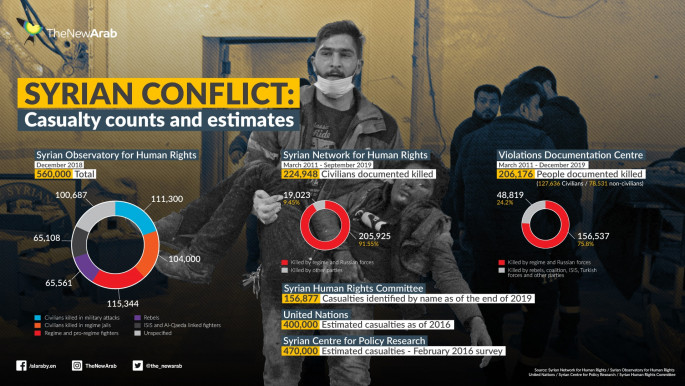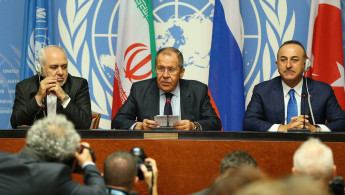Turkey, Russia and Iran to hold virtual Astana talks on Syria
The trilateral talks will take place via video conference on Wednesday.
2 min read
The Astana process has failed to halt attacks against Syrian civilians [Anadolu]
Top diplomats from Russia, Turkey and Iran will convene a fresh round of negotiations for the Astana peace process on Syria on Wednesday.
Russian Foreign Minister Sergei Lavrov will meet with his Turkish and Iranian counterparts, Mevlut Cavusoglu and Mohammad Javad Zarif, via video conference, the Russian ministry told state news agency TASS.
The trilateral talks follow on the heels of a meeting between Zarif and Syrian President Bashar al-Assad in Damascus on Monday.
Zarif used the occassion to call on the United States to lift sanctions on the Islamic Republic and Assad's Syria, claiming that Washington had "shown its inhuman face to the world" by refusing to lift sanctions amid the coronavirus pandemic.
The meeting between the close allies coincided with the resumption of regime-led bombardment in the northwestern province of Idlib, the last major territory held by Syrian rebel forces.
Iranian-backed regime reinforcements have recently been sent to the frontlines of Idlib with a view of launching a new offensive on rebel positions, according to the Syrian opposition news site Baladi News.
The Assad regime has repeatedly broken a Turkish-Russian brokered ceasefire covering Idlib.
Russian Defence Minister Sergey Shoygu reportedly flew to Damascus last month to press the Syrian leader to respect the ceasefire despite Moscow's key role in continuing hostilities during the nine-year war.
Russia's 2015 intervention in the conflict on behalf of Assad is considered to be the major factor in the dictator's longevity.
The last round of the Astana talks took place in December last year.
A meeting between top diplomats had been scheduled for last month but was postponed due to the global Covid-19 crisis.
 |
| [Click to enlarge] |
The Astana negotiations on Syria began at the end of 2016, setting up four "de-escalation zones" in rebel-held areas.
However, Russia and the regime continued to attack the ceasefire areas, overrunning Eastern Ghouta, northern Homs and Daraa zones in 2018, and leaving Idlib province, under heavy attack since April last year.
More than 500,000 people have been killed and millions more displaced in the Syrian conflict, which began in 2011 after the Assad regime brutally suppressed pro-democracy protests.
Follow us on Facebook, Twitter and Instagram to stay connected





 Follow the Middle East's top stories in English at The New Arab on Google News
Follow the Middle East's top stories in English at The New Arab on Google News


